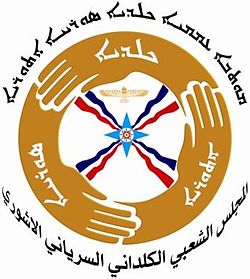- Chaldean Syriac Assyrian Popular Council
-
Chaldean Syriac Assyrian Popular Council
ܡܘܬܒܐ ܥܡܡܝܐ ܟܠܕܝܐ ܣܘܪܝܝܐ ܐܬܘܪܝܐ
المجلس الشعبي الكلداني السرياني الاشوري
Leader Sarkis Aghajan
Jamil ZaytoFounded March 12, 2007 Headquarters Ankawa, Iraq Ideology Assyrian nationalism, Conservatism, Neoconservatism, Christian democracy Political position Centre-right Seats in the Kurdistan Parliament: 3 / 111Politics of Iraq
Political parties
ElectionsChaldean Syriac Assyrian Popular Council is a political party in Iraq that was founded by Sarkis Aghajan, a high ranking KDP, in 2007.[1] The Party runs Ishtar TV and publishes several different monthly magazines.
In the local January elections of 2009, the party was part of a coalition that won the Assyrian reserved seat in Baghdad and Ninawa.
The party's main goal is to have the heavily Assyrian populated Nineveh plains receive self-administrative government or outright autonomy. The party claims the majority of the population in the Nineveh plains suffers neglect and lack of service because of their Christian faith.[2]
The party is closely affiliated with Massoud Barzani's KDP and was accused in previous elections of intimidating and bribing Christians. The bribes included promises of employment and reductions in rents at Aghajan-owned apartments.[3] This was confirmed by an investigation led by UNPO and Assyria Council of Europe in the January 2009 elections.[4][5]
On July 25, 2009, the party ran for the first time on its own for the 111-member Kurdistan National Assembly (see Iraqi Kurdistan legislative election, 2009). It received over 10,000 votes and won 3 of the 5 reserved Assyrian seats.
Platform
There are two main issues that the party has based itself on. The first is to establish "self-government" in the Assyrian-inhabited areas of northern Iraq.[6] The area generally includes the Nineveh plains, which compromises the three district of Tel Keppe, Bakhdida, and Al-Shikhan. The second issue the party bases itself on is to have the three different Assyrian sub-sects all united as under one name in the constitution of Iraq and Iraqi Kurdistan region.[6]
External links
References
Kurdistan Democratic Party - Patriotic Union of Kurdistan (59) • Change List (25) • Kurdistan Islamic Union - Islamic Group of Kurdistan - Kurdistan Socialist Democratic Party (13) • Turkmen Democratic Movement (3) • Chaldean Syriac Assyrian Popular Council (3) • Islamic Movement of Kurdistan (2) • Assyrian Democratic Movement (2) • Kurdistan Communist Party (1) • Iraqi Turkmen Front (1) • Erbil Turkmen (1) • Independent Armenian (1)
Assyrian/Syriac/Chaldean political parties  IraqAssyrian Democratic Movement . Assyrian General Conference . Chaldean Syriac Assyrian Popular Council . Assyrian Patriotic Party . Assyrian Progressive Nationalist Party . Syriac Independent Gathering Movement . Syriac Independent Unified Movement
IraqAssyrian Democratic Movement . Assyrian General Conference . Chaldean Syriac Assyrian Popular Council . Assyrian Patriotic Party . Assyrian Progressive Nationalist Party . Syriac Independent Gathering Movement . Syriac Independent Unified Movement

 Lebanon
Lebanon Syria
SyriaOthers Categories:- Assyrian political parties
- Assyrian organizations
Wikimedia Foundation. 2010.
